Essential Steps for Employee Background Checks

Essential Steps for Employee Background Checks
An employee background check is a critical step in the hiring process that allows employers to verify a candidate’s personal, professional, and sometimes even financial history. These checks are conducted to confirm that the information provided by the candidate is accurate and to ensure the individual is fit for the role based on the organization’s policies and standards.
Background checks typically include verifying education credentials, employment history, criminal records, and references. For some industries, checks may also include drug testing, credit reports, or even social media reviews. This process provides employers with a comprehensive understanding of a candidate’s qualifications and character, reducing the risks associated with bad hires.
Whether you’re hiring for a small business or a multinational corporation, employee background checks are an essential part of fostering a safe, reliable, and productive workplace.
Why Are Employee Background Checks Important?
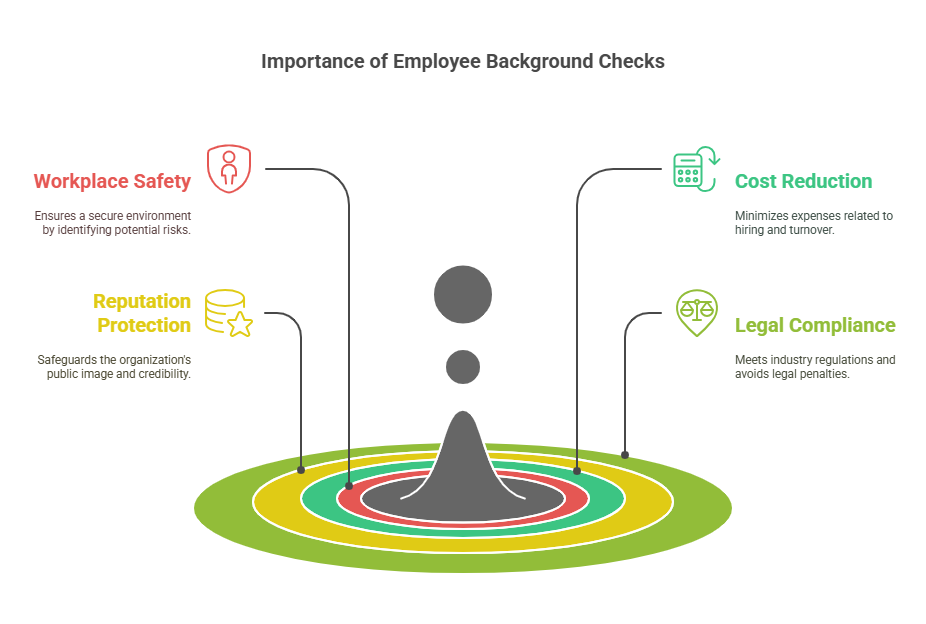
The hiring process is more than just filling positions—it’s about building a team of trustworthy individuals who will drive the organization’s success. Here’s why background checks are indispensable in achieving that goal:
1. Ensuring Workplace Safety and Security
Organizations have a responsibility to ensure the safety of their employees, clients, and stakeholders. Hiring someone with an undisclosed criminal history or falsified qualifications can lead to severe consequences, including workplace violence, fraud, or data breaches. By performing thorough background checks, employers can identify potential red flags that could pose risks to the organization.
2. Reducing Hiring and Turnover Costs
Replacing an employee can be costly. From recruiting and onboarding to training, the process of finding a replacement is time-intensive and expensive. A bad hire not only affects productivity but also drains resources. Background checks mitigate this risk by confirming that candidates have the skills and character to succeed in the role, reducing the likelihood of early termination.
3. Protecting the Company’s Reputation
An organization’s reputation is one of its most valuable assets. Imagine the public relations nightmare of hiring someone who turns out to have a fraudulent background or a history of misconduct. Thorough screening ensures that employees align with the company’s values, protecting the organization’s credibility and public image.
4. Legal and Regulatory Compliance
Certain industries, such as healthcare, finance, and education, have stringent legal requirements regarding employee screening. For example, positions involving access to sensitive information or vulnerable populations may require mandatory criminal background checks or child abuse clearances. Non-compliance with these requirements can lead to legal penalties and lawsuits. Conducting thorough employee background checks ensures the organization meets all regulatory standards.
Key Components of Employee Background Checks
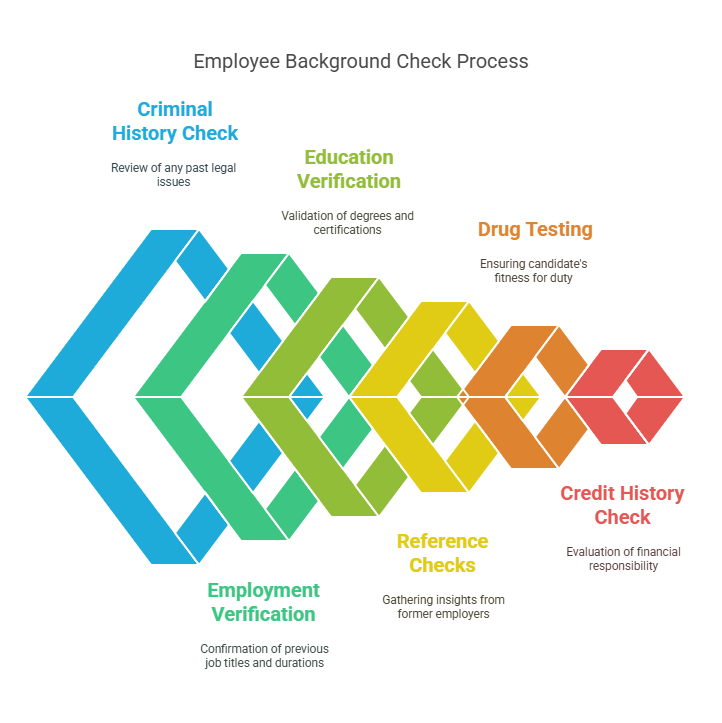
While background checks can vary based on the job role, industry, and organizational policies, most screenings cover the following areas:
1. Criminal History Checks
This is one of the most common components of a background check. Employers review national, state, or county-level criminal records to ensure the candidate has no convictions that could disqualify them from the role. For example, roles involving financial responsibility may screen for fraud or embezzlement charges, while positions requiring interaction with children may require a clean record concerning abuse or neglect.
2. Employment Verification
Candidates often list their job titles, responsibilities, and employment durations on their resumes. Employment verification ensures that this information matches the candidate’s claims. This step is crucial for identifying fabricated work experience or exaggerated achievements.
3. Education Verification
False claims about degrees and certifications are surprisingly common. Education verification confirms that the candidate attended the institutions they listed and earned the degrees or qualifications stated on their application.
4. Reference Checks
Reference checks involve reaching out to the candidate’s former employers, supervisors, or colleagues to gain insight into their professional behavior, performance, and work ethic. This is an opportunity to hear about the candidate from people who have directly interacted with them.
5. Drug Testing
For industries such as transportation, manufacturing, and healthcare, drug testing is often a mandatory part of the hiring process. It ensures that candidates are physically and mentally fit for their roles and do not pose risks related to substance abuse.
6. Credit History
While not applicable to every job, positions involving financial responsibilities may require a credit history check. Reviewing credit reports helps employers assess the candidate’s financial responsibility and identify any patterns of mismanagement or fraud.
7. Social Media Screening
With the rise of social media, many employers now consider candidates’ online presence during the hiring process. This involves reviewing public profiles on platforms such as LinkedIn, Facebook, and Twitter to ensure there’s no content that could damage the company’s reputation or suggest unprofessional behavior.
Common Myths and Misconceptions About Employee Background Checks
Despite their widespread use, employee background checks are often surrounded by myths that can lead to misunderstandings. Let’s debunk some of the most common misconceptions:
Myth 1: Background Checks Are Invasive
Some candidates believe that background checks are an infringement on their privacy. In reality, background checks are conducted within strict legal frameworks designed to protect individual rights. Employers must obtain the candidate’s consent before initiating the process and ensure that the information reviewed is relevant to the job.
Myth 2: They Are Only Necessary for High-Level Positions
While it’s true that executive-level roles often require extensive screening, background checks are equally important for entry-level and mid-level positions. Regardless of the role, verifying a candidate’s credentials and history helps prevent future risks and ensures a safer workplace.
Myth 3: Background Checks Are the Same for Every Role
Employee background checks are highly customizable based on the organization’s needs and the job’s requirements. For example, a role in healthcare might require more in-depth criminal record checks than a position in marketing.
Myth 4: They Delay the Hiring Process
Modern employee background check services, such as those provided by companies like Exact Background Checks, are designed to be efficient and timely. These services use advanced technology and streamlined processes to deliver results quickly without compromising accuracy.
The Growing Need for Employee Background Checks
In today’s fast-paced, competitive job market, the pressure to fill roles quickly can sometimes lead employers to skip or rush the screening process. However, this can have disastrous consequences. Consider the following statistics:
- A study by CareerBuilder found that 58% of resumes contain inaccuracies, including embellished skills and false employment claims.
- According to the U.S. Chamber of Commerce, employee theft costs businesses over $50 billion annually.
- The National Association of Professional Background Screeners (NAPBS) reports that nearly 85% of employers conduct some form of background screening, highlighting its importance in modern hiring practices.
As workplace dynamics evolve and industries face increasing scrutiny, conducting thorough and compliant employee background checks is no longer optional—it’s a necessity.
The Role of Technology in Background Checks
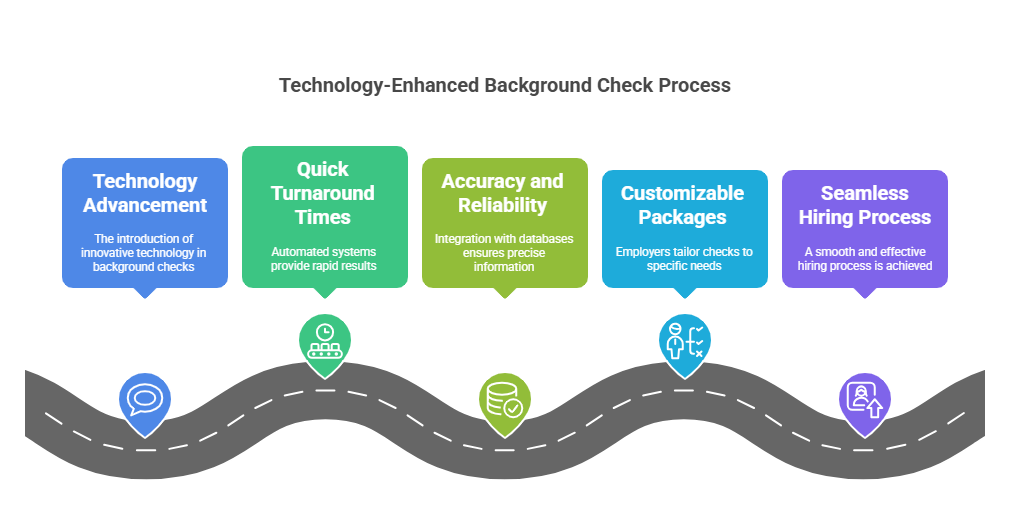
The advancement of technology has significantly improved the efficiency and reliability of background checks. Services like Exact Background Checks leverage innovative software to provide:
- Quick Turnaround Times: Automated systems can deliver results within hours or days, ensuring the hiring process remains on track.
- Accuracy and Reliability: By integrating with national and international databases, modern background check services can uncover critical information with high accuracy.
- Customizable Packages: Employers can tailor the background check process to include only the components relevant to their industry and the specific role.
In an era of digital transformation, partnering with a trusted background screening provider ensures a seamless, compliant, and effective hiring process.
Introduction to Types of Background Checks
Employee background checks come in various forms, each tailored to uncover specific aspects of a candidate’s history. Depending on the industry, job requirements, and organizational policies, employers may combine multiple types of screenings to create a comprehensive evaluation process.
In this section, we’ll explore the types of background checks, the step-by-step processes involved, and the immense benefits of conducting thorough pre-employment screening. We’ll also highlight the role of trusted service providers like Exact Background Checks, whose expertise ensures accuracy, compliance, and efficiency.
Types of Employee Background Checks
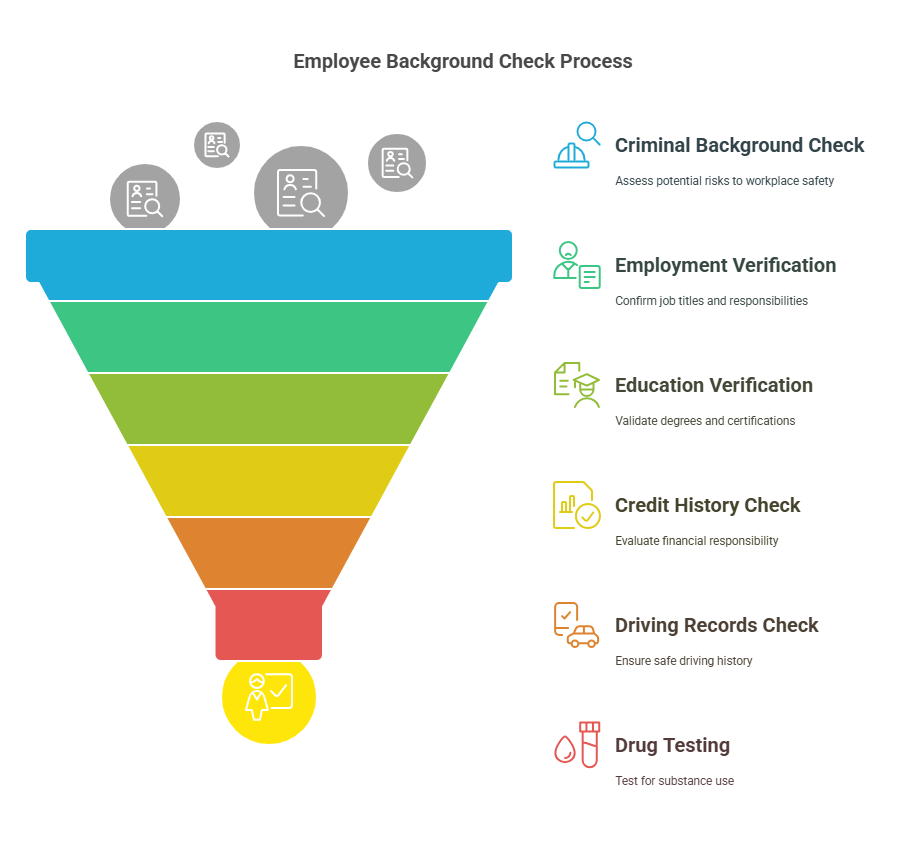
1. Criminal Background Checks
Criminal background checks are essential for identifying potential risks to workplace safety. Employers review federal, state, and local criminal records to ensure that candidates do not have convictions or pending cases that could disqualify them from the position.
Key components of criminal checks include:
- Felony and misdemeanor convictions
- Arrest records (where legally permissible)
- Pending cases
- Sex offender registry status
- History of violent or financial crimes
Industries where criminal checks are critical:
- Healthcare
- Education
- Financial services
- Law enforcement
2. Employment Verification
Many candidates embellish or fabricate their employment history on resumes. Employment verification involves contacting previous employers to confirm:
- Job titles
- Dates of employment
- Responsibilities
- Reasons for leaving
This step ensures that the candidate has the professional experience required for the role and that their claims are accurate.
3. Education Verification
For roles that require specific degrees, certifications, or technical expertise, verifying education credentials is essential. This process checks the authenticity of:
- Degrees earned
- Diplomas and certifications
- Institutions attended
- Dates of attendance
Employers often find discrepancies in resumes, such as candidates listing incomplete degrees as completed or falsely claiming prestigious qualifications.
4. Credit History Checks
Credit checks are conducted for positions involving financial responsibilities, such as accounting, banking, or roles that require access to sensitive company funds. These checks reveal:
- Credit score
- History of bankruptcies
- Debt-to-income ratio
- Financial management patterns
While a poor credit history may not necessarily disqualify a candidate, it provides employers with insights into how the individual handles financial responsibilities.
5. Driving Records
For positions that require operating vehicles—such as delivery drivers, truck drivers, or rideshare operators—driving record checks are critical. Employers look for:
- Traffic violations
- Suspended or revoked licenses
- DUIs or reckless driving charges
Ensuring a clean driving record helps mitigate risks associated with on-the-job accidents.
6. Drug Testing
Drug testing is particularly important in industries where safety is paramount, such as construction, healthcare, or transportation. Pre-employment drug screenings test for substances like:
- Marijuana
- Cocaine
- Opioids
- Amphetamines
In addition to pre-employment testing, many companies implement random drug testing policies to ensure ongoing workplace safety.
7. Reference Checks
Reference checks involve contacting former supervisors, colleagues, or mentors to gain insights into a candidate’s:
- Work ethic
- Professional behavior
- Strengths and weaknesses
- Team collaboration skills
These checks provide valuable context that helps employers make more informed hiring decisions.
8. Social Media Screening
Social media has become an increasingly popular tool for assessing candidates’ public behavior. Employers may review platforms like LinkedIn, Facebook, Twitter, and Instagram to identify potential concerns such as:
- Inappropriate or unprofessional posts
- Evidence of discriminatory behavior
- Public statements that could harm the company’s reputation
Social media screening must comply with privacy laws and focus only on public-facing content.
The Process of Conducting a Background Check
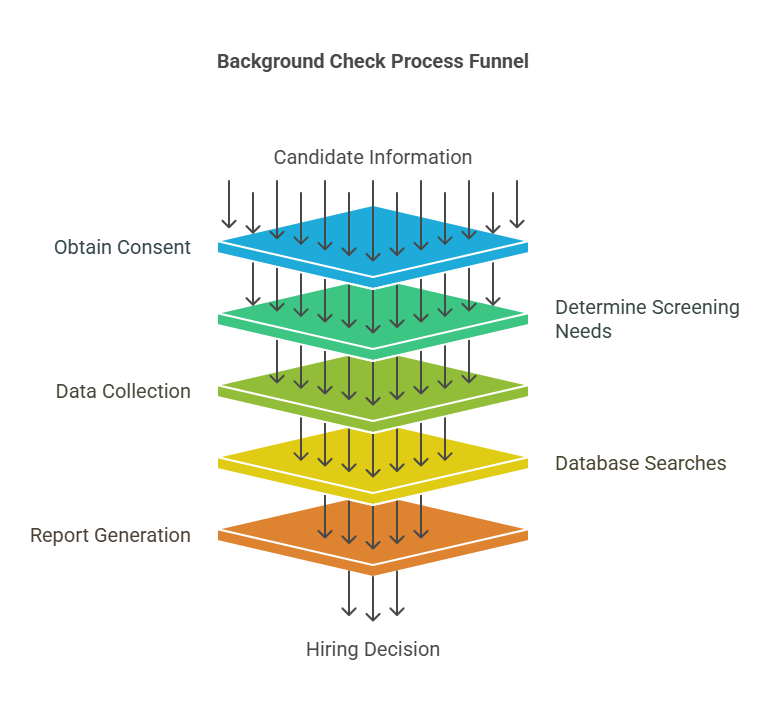
Employers often partner with professional background check providers, like Exact Background Checks, to streamline the process. Here’s a step-by-step overview:
1. Obtain Consent
Before initiating any background check, employers must obtain the candidate’s written consent, as required by law. Transparency ensures the process is ethical and compliant.
2. Determine Screening Needs
Not all positions require the same level of screening. Employers identify which checks (e.g., criminal, education, credit) are relevant based on the job description and industry standards.
3. Data Collection
The background screening provider collects relevant data from the candidate, such as:
- Social Security Number
- Date of birth
- Full name and aliases
This information ensures accurate matching with official records.
4. Database Searches and Verification
The provider searches various databases, contacts institutions, and verifies the candidate’s information. For example:
- Criminal records are pulled from federal, state, and county databases.
- Employment and education credentials are confirmed directly with previous employers or educational institutions.
5. Report Generation
Once the background check is complete, a detailed report is generated, highlighting verified information, discrepancies, and any red flags. Employers use this report to make final hiring decisions.
Benefits of Thorough Employee Background Checks
Conducting comprehensive background checks provides numerous advantages to both employers and employees:
1. Improved Hiring Accuracy
Background checks confirm that candidates meet the qualifications required for the role. This reduces the likelihood of hiring individuals who misrepresent their skills or experience.
2. Enhanced Workplace Safety
Screening for criminal history, drug use, and behavioral issues ensures a safe and secure work environment for employees and clients alike.
3. Regulatory Compliance
Background checks help companies meet industry-specific legal requirements. For example, healthcare employers must adhere to laws like the Health Insurance Portability and Accountability Act (HIPAA), which mandates rigorous screening for roles involving sensitive patient data.
4. Reduced Employee Turnover
Hiring the right candidate from the start reduces the costs and disruptions associated with turnover. Background checks improve retention by ensuring new hires are a good fit for the role and the company culture.
5. Safeguarding Reputation
By hiring credible and trustworthy employees, companies protect their brand image and avoid negative publicity stemming from unethical or unqualified staff.
6. Financial Protection
For roles involving financial transactions, credit checks and employment verifications ensure that candidates have a history of responsible behavior, minimizing risks of fraud or embezzlement.
Why Choose Exact Background Checks?
With so many moving parts, the background check process can be overwhelming for employers. That’s where trusted providers like Exact Background Checks come in.
Key Features of Exact Background Checks:
- Comprehensive Screening: Their services cover all types of checks, from criminal history to social media screening.
- Fast Turnaround: Advanced technology ensures quick results without compromising accuracy.
- Customizable Packages: Tailored screening solutions meet the unique needs of each organization.
- Compliance Expertise: Exact Background Checks stays updated on all legal and regulatory requirements, ensuring 100% compliance.
- Dedicated Support: A team of professionals is available to guide employers through the process and answer any questions.
By partnering with Exact Background Checks, employers can streamline their hiring process, reduce risks, and focus on what matters most—building a strong, reliable workforce.



